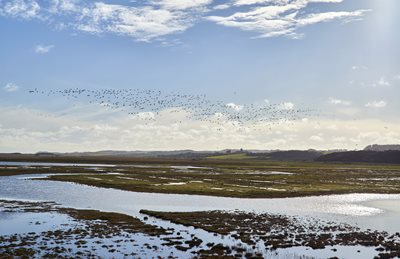If you are lucky enough to live in Norfolk then ‘wildness’ is really never that far away.
When peering skywards to marvel at the great lines of noisy wild geese; when stopping a moment to listen to bird song in spring; when swifts scream overhead in summer; or when walking our Norfolk coast on stormy autumn days, our lives are enriched by a touch of wildness.

Cley Marshes, credit Richard Osbourne
This wildness is not here by chance. Undoubtedly the long history of conservation in our county has played a significant role in keeping some of our wildest places special. Places like Norfolk Wildlife Trust’s Cley Marshes, whose purchase back in 1926 became the reason for establishing the first Wildlife Trust, and was the birthplace of today’s national network of 46 Wildlife Trusts, now protecting more than 2,000 nature reserves.
The wildness, wildlife and wild places that we enjoy today are in large part because of the work of people who cared about wildlife. People who in the past dedicated their lives to protecting nature. People who fought the battles for – and won support for – laws to protect wildlife, which we now take for granted. People who both raised and gave funds to buy some of our best wild places and manage them as nature reserves. People who loved birds and recognised that to protect migratory species we had to work internationally. Their vision created the international conventions that protect a network of crucial wetland sites along the world’s great flyway migration routes.
Today many of those hard won laws that now protect wildlife here in Norfolk, across Britain and indeed across much of Europe, are in force through European Union legislation and directives. As our politicians struggle over the many huge issues and difficulties that surround Britain leaving the European Union, there are real fears that our wildlife may lose some of these protections; protections that for decades have helped safeguard not just wildlife, but have also protected our own environment.
Our politicians are perhaps unlikely to have wildlife at the top of their agendas when the detail and complexity of Brexit is being negotiated. So now is a time when again all those who care about wildlife need to stand up and make our voices heard.

Brown hare, credit David Tipling/2020vision
An Environment Bill, the first for 40 years, is making its way through parliament. If this incorporates strong protections for wildlife, and effective, legally binding mechanisms to protect our environment, then it can ensure none of the existing safeguards wildlife has under European law are weakened or lost.
Nature in our busy modern world faces myriad threats and our natural world is in critical condition. The Wildlife Trusts collectively are asking people right now to speak up for nature, ensure our politicians take note, and make this new Environment Bill do more than just protect the nature we have left.
We are calling for an Environment Act that secures the recovery of nature and a healthy environment for the benefit of people and wildlife. It needs to set ambitious, legally binding targets to clean up our air, seas and rivers; return our soils to health; ensure resilient ecosystems on land and at sea; improve access to green space; address climate change; and reduce waste. And it should establish an independent watchdog with the powers to hold the UK government and public bodies to account, underpinned by world-leading environmental principles enshrined in law.
This is a critical time for our wildlife, with some existing protections at risk. If you would like to add your voice to ensuring wildlife in both Norfolk and across the UK gets the legal protection it needs,
visit our website for a form to directly contact your MP. Please help us achieve our aim of saving Norfolk’s wildlife for the future.
Header image: Corn Bunting by David Tipling / 2020vision